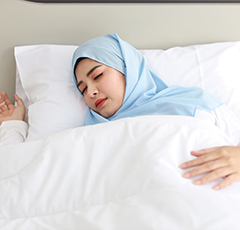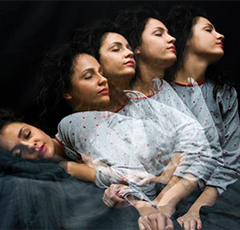Overview
Sleep disorders encompass a range of conditions that affect sleep quality, duration, and overall health. These disorders disrupt normal sleep patterns and can lead to daytime fatigue, impaired functioning, and other health complications. Diagnosis and treatment often involve specialized medical evaluation and interventions to improve sleep quality and restore optimal sleep patterns.
TREATMENTS & PROCEDURE

Difficulty falling asleep or staying asleep despite adequate opportunity for sleep.
Insomnia is characterized by persistent difficulty initiating or maintaining sleep, leading to daytime impairment. Causes can include stress, medical conditions, medications, or poor sleep hygiene.

Breathing pauses during sleep, disrupting sleep continuity and oxygen levels.
Sleep apnea involves repetitive episodes of complete or partial upper airway obstruction during sleep, leading to fragmented sleep and daytime sleepiness. It’s commonly associated with snoring and can contribute to cardiovascular risks.

Uncomfortable sensations in the legs causing an irresistible urge to move.
RLS causes uncomfortable sensations in the legs, often relieved by movement. Symptoms typically worsen in the evening or at night, affecting sleep onset and maintenance.

Excessive daytime sleepiness with sudden loss of muscle tone (cataplexy)
Narcolepsy is a neurological disorder characterized by excessive daytime sleepiness and sudden loss of muscle tone (cataplexy). It can also involve vivid hallucinations during sleep onset or upon awakening.

Abnormal behaviors or experiences during sleep.
Parasomnias include sleepwalking, night terrors, and REM sleep behavior disorder (acting out dreams). These disorders disrupt sleep and can pose safety risks.
Difficulty falling asleep or staying asleep despite adequate opportunity for sleep.

Insomnia is characterized by persistent difficulty initiating or maintaining sleep, leading to daytime impairment. Causes can include stress, medical conditions, medications, or poor sleep hygiene.
Breathing pauses during sleep, disrupting sleep continuity and oxygen levels.

Sleep apnea involves repetitive episodes of complete or partial upper airway obstruction during sleep, leading to fragmented sleep and daytime sleepiness. It’s commonly associated with snoring and can contribute to cardiovascular risks.
Uncomfortable sensations in the legs causing an irresistible urge to move.

RLS causes uncomfortable sensations in the legs, often relieved by movement. Symptoms typically worsen in the evening or at night, affecting sleep onset and maintenance.
Excessive daytime sleepiness with sudden loss of muscle tone (cataplexy)

Narcolepsy is a neurological disorder characterized by excessive daytime sleepiness and sudden loss of muscle tone (cataplexy). It can also involve vivid hallucinations during sleep onset or upon awakening.
Abnormal behaviors or experiences during sleep.

Parasomnias include sleepwalking, night terrors, and REM sleep behavior disorder (acting out dreams). These disorders disrupt sleep and can pose safety risks.
FAQs
Sleep disorders can result from various factors, including medical conditions, stress, medications, and lifestyle habits.
Insomnia involves difficulty falling asleep or staying asleep despite adequate opportunity for sleep, often leading to daytime impairment.
Yes, many sleep disorders can be effectively managed through lifestyle changes, medications, and behavioral therapies tailored to the specific disorder.
Sleep studies, such as polysomnography, are often necessary to diagnose and assess sleep disorders by monitoring sleep stages, breathing patterns, and physiological parameters.
Diagnosis often involves a clinical assessment, sleep diary, and may include a polysomnography (sleep study) to evaluate sleep patterns and disturbances.
Symptoms of sleep apnea include loud snoring, gasping or choking during sleep, daytime sleepiness, and morning headaches.
Narcolepsy is a neurological disorder characterized by excessive daytime sleepiness, sudden loss of muscle tone (cataplexy), and disturbances in REM sleep.
Yes, cognitive-behavioral therapy for insomnia (CBT-I) is effective in improving sleep habits, addressing underlying causes, and promoting better sleep quality.
Respiratory & Sleep Medicine Doctors

